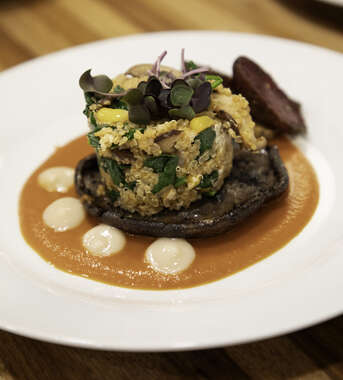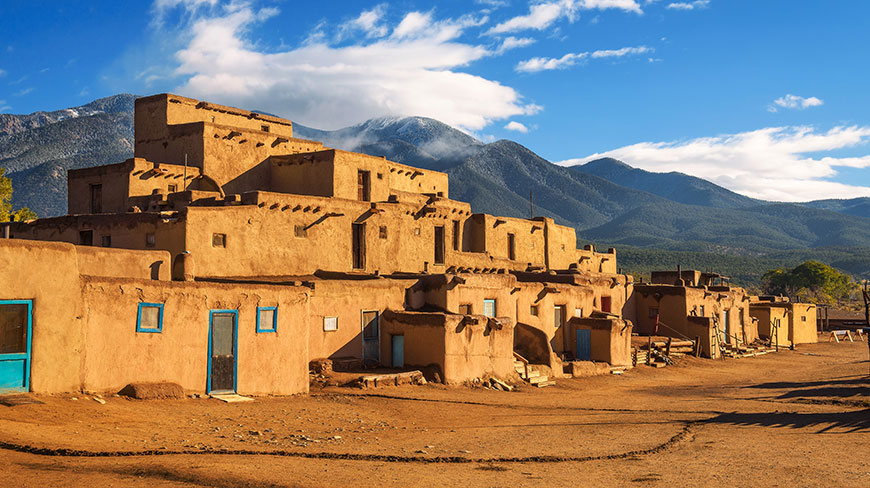Chefs Frank & Whitewater: Food as Medicine, Culture & Connection
- Food as Medicine and Connection: Learn how Chefs Lois Ellen Frank and Walter Whitewater teach that food is more than sustenance; it is a form of medicine, a connection to the earth, and a way to share cultural stories and energy.
- Revitalizing Indigenous Foodways: Discover their "seed to plate, soil to sky" philosophy, which honors traditional ingredients and sustainable practices to revitalize and celebrate the beauty and resilience of Native American cuisine.
- A Sensory Culinary Experience: Explore their partnership with Road Scholar, where participants are invited into their kitchen for a tactile experience that connects them to the land, stories and unique flavors of the Southwest.
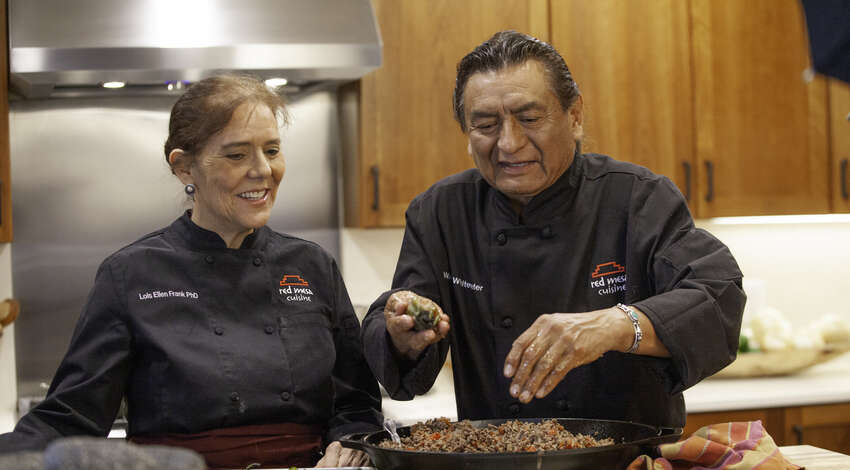
Chef Lois Ellen Frank, Ph.D., first met Chef Walter Whitewater during a San Carlos Apache coming-of-age ceremony for the daughter of a close friend. What began as a chance encounter quickly grew into a partnership rooted in shared passions: educating others and celebrating Indigenous foodways. Today, in their Santa Fe kitchen at Red Mesa Cuisine, they welcome Road Scholar participants not just to enjoy incredible food, but to connect with the land, the locally sourced ingredients of the Southwest and the stories behind each dish.
“Chef Frank and Chef Whitewater invite you in, and you feel like you're a part of the family,” explains Elena Junes, Road Scholar's director of Southwest programs and a close family friend of Chef Frank. “You walk through the garden, and you learn and share in their desire to have a healthy lifestyle.”
Chef Lois Ellen Frank, a Native foods historian and James Beard Award-winning author of the cookbook “Foods of the Southwest Indian Nations” (2002, Ten Speed Press), with Chef Whitewater as culinary adviser, discovered her passion for food early in life. “I've always been attracted to food,” she says. “My mom always had a garden with plenty of excess vegetables. When I was about 11 or 12, we would go to the end of the road and sell them.”
Seeing the bigger picture, she started baking carrots and zucchini into little breads. “Those moved quickly! And I started to realize that you can take something raw and make it into something that someone can enjoy.”
Throughout high school, Chef Frank’s mother let her and a couple of friends work their way through recipes from different cookbooks, focusing on local cuisine and the very beginning of what we now know as farm-to-table. After graduation, she worked in restaurants and took culinary classes, though the influence was very classic European continental cuisine.
“Most of the executive chefs I worked for were men at the time,” she explains, “and I was always encouraged to ‘go into pastry.’ However, I really liked cooking savory dishes with lots of vegetables and plants, and I didn’t want to become a pastry chef.”
After leaving the restaurant world on the eastern end of Long Island, New York, she earned her undergraduate degree in photography from Brooks Institute and began working in food photography, which came naturally to her after being trained in restaurants. A desire to delve deeper into the cultural significance of food led her to pursue a Ph.D. in culinary anthropology from the University of New Mexico in 2011.
While trying to write a cookbook on Native American cuisine, “I was told there was no such thing as Native American cuisine,” she recalls, “but I knew there was a story of resilience, tradition and connection waiting to be told.”
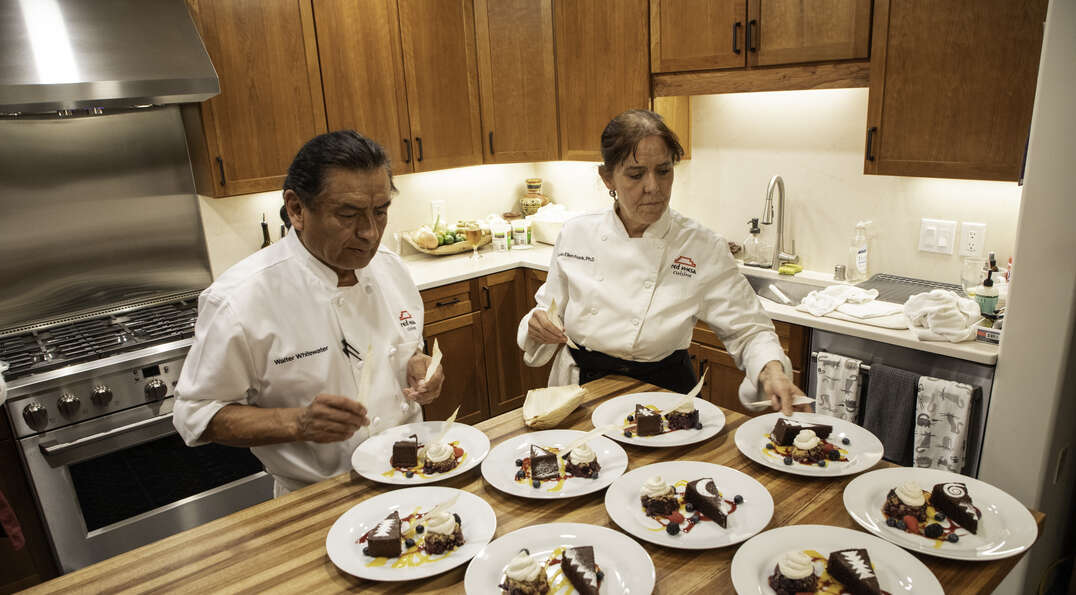
Chefs Lois Ellen Frank(right) and Walter Whitewater(left).
That story includes Chef Walter Whitewater, a Diné (Navajo) chef from the Navajo Nation. “I'm self-taught,” he says, “and I was lucky enough to learn from those who took me under their wing. I learned that I could make my own method — I don't have to do what the French or Italian chefs do. I want to go beyond what people assume Native [American] food to be, what our food used to be. I want to show people how beautiful it is.”
Chef Whitewater accompanies his dishes with stories that underline the connection of food to the earth. “I talk about the animal. I talk about the plants and the medicine because, for us, food is medicine, and we utilize it that way. It's an exchange of energy. I tell stories of my culture. And when we finish, people are often in tears. This moves people — that's something,” he says.
At Red Mesa Cuisine, the dynamic team blends ancestral knowledge with contemporary flair. Sourcing ingredients from Native and local vendors, they create dishes that honor traditional methods while showcasing modern artistry. Their philosophy extends beyond the plate, with sustainability and giving back central to their mission. “We believe food is healing to the body and the spirit,” Chef Whitewater says. "But we also have to care for the earth that gives us these gifts.”
From composting to advocating for a plant-forward diet and cooking, both chefs are committed to creating a healthier, more sustainable future. “We're very conscious with water,” Chef Frank notes, using dishwater to water plants, for example. “Our servers take home leftovers, or Chef Whitewater makes an offering with them. Nothing goes to waste.”
Inside the Road Scholar program Desert Bounty: Celebrating Santa Fe’s Agriculture & Cuisine, participants experience these values firsthand, beginning with an introduction to the plants and herbs used in their meals.
“It's a tactile experience,” Chef Frank says. “Food is a sensory experience, so we want participants to see what the sumac plant looks like and how it grows. We want them to smell the chiles cooking in our kitchen and to understand the connection between the earth and their plate.”
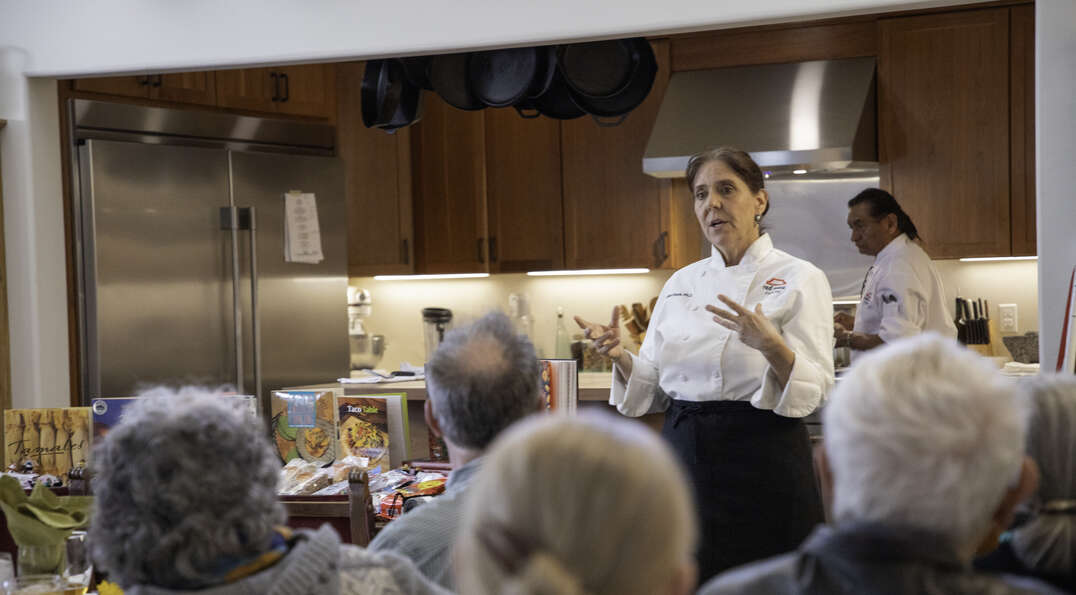
Beyond the Road Scholar program, Chefs Frank and Whitewater are dedicated to revitalizing Indigenous foodways and addressing health disparities in Native communities. Their latest cookbook, “Seed to Plate, Soil to Sky” (published by Balance, an imprint of Grand Central Publishing), has become a tool for promoting wellness and sustainability. At the International Association of Culinary Professionals awards in 2024, it was the sole cookbook nominated in three categories, winning two: Health & Wellness and Food Issues & Matters.
Chef Frank contextualizes their work by reminding participants, “Everyone is indigenous to this planet, and as Native Elder Brophy Toledo states, ‘Everyone is an Earth Person. We all need to work together to be stewards of this one mother, this one Earth.’” She encourages people to ask family members about their lineage and record their stories to pass down to future generations. "Ask questions like, 'Who are you? Where did you come from? What's the story of who you are?' That connection is vital."
Their work embodies the values of Road Scholar: lifelong learning, cultural exchange and deep curiosity about the world. "When we prepare these foods, we revitalize everything associated with them. And when we feed people, we nurture them while honoring the ancestors who cultivated these foods," Chef Frank reflects. “We try to teach core values of respect and compassion, and all of these are integral parts of being a good human being.”
Elena Junes agrees. “In addition to giving back to the community, they radiate kindness and curiosity. Participants over the years have absolutely loved them. They share so much, and that embodies the Road Scholar spirit,” she says, adding, “Also, the food is amazing.”
Ready to nourish your curiosity and your spirit? Explore the flavors of Santa Fe with us.

